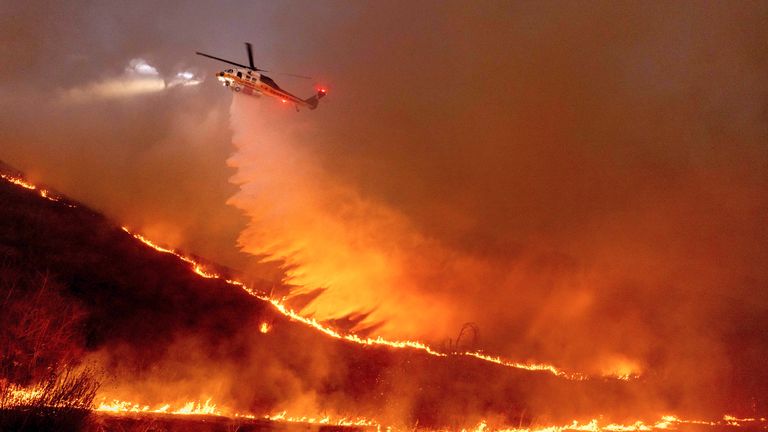Lessons from Los Angeles

We’re back, baby! Over the brief winter interlude the newsletter hit a milestone, our second anniversary of cultural takes and inattentive typos. This project began following my exodus from Twitter in 2022 and has been going strong ever since. Thanks to you for being along for the ride.
One of the downsides of taking time off from the newsletter is that I come back with so much to write about.
There's a travelog in me about our amazing trip to Egypt.
There's another travelog to be written about our visit to Northern England and going to Anfield and Hillsbourough Stadiums, home of Liverpool and Sheffield Wednesday respectively.
There's also a piece in me about my decision this week to re-quit Instagram and try to wean myself from all Meta platforms.
There's also a newsletter in me ranting about my time back in the US and the jerkhole that broke into our (borrowed) car and stole my backpack that had my Nintendo Switch and laptop in it.
But those will have to wait for a bit.
This week LA burned.
Wildfires swept across Los Angeles, leaving devastation in their wake. Malibu, the Palisades, Hollywood Hills, and Pasadena were among the worst-hit areas. At least eighteen people died. There’s been countless homes destroyed and vast tracts of land scorched.
Yesterday morning, local time, I found myself in one of my irregular, furious texting conversations with my boy Zach back home. We're both devotees of the Ringer ecosystem and were discussing our mutual concern for people we know in real life and from the Ringer Network who are based in Los Angeles. I regularly listen to about a half dozen Ringer podcasts, I’ve listened to some shows for over a decade, and nearly all the hosts are based in LA.
Because everything in America becomes predictably and inevitably politicized there's a simmering, dumb AF online discourse where people are blaming the fire victims in Los Angeles, implying the disasters are a result of the particular choices voters in the state have made. That bad faith discourse is too stupid to be debated and I'm not going to waste your time doing so.
What I am going to do however is highlight how various responses, even those from people who should know better, are reflective of a collective lack of faith in the power of the state that’s been baked into many over the last forty-five years.
Despite what Zombie Reagan and his neoliberal ideological descendants may say, in moments of crisis only the state has the capacity to respond at the necessary scale.
In the face of a rapidly moving inferno, private solutions simply won’t cut it. Libertarian fantasies of private firefighting squads proved fantastical. What remains is the state—government agencies coordinating thousands of personnel, deploying helicopters and fire engines, and ensuring emergency relief reaches those in need. Now, are there criticisms to be made of the government response? Absolutely. But there’s no market based replacement for state capacity.
Unfortunately, belief in the state has been systematically eroded over the past 45 years. The neoliberal brainworm has us addicted to for-profit healthcare, military contractors (private mercenaries by another name) fighting our wars, and has (some) well-meaning people trying to fix US schools with privatization schemes like vouchers.
Reagan’s famous quip—“The nine most terrifying words in the English language are: I'm from the Government, and I'm here to help”—turned skepticism into dogma. Neoliberalism taught Americans to distrust public institutions, pushing privatization and austerity in their place.
The result? An underfunded public sector struggling to meet its mandate. Infrastructure meant to prevent disasters—like firebreaks or robust electrical grids—has been neglected.
Just as no amount of private charity could replace the New Deal’s electrification of rural America or the projects of the WPA, no private entity can replace the state when the stakes are life and death.
My various travels and life abroad have given me a new perspective on what a capable government can achieve. Here, the state is deeply involved in every major infrastructure project—from highways to hospitals to cultural districts. This isn’t to say the system is perfect; like any state, it has its shortcomings and there have been plenty of failed projects. But what stands out is the centrality of the government’s role.
I know I am gonna lose some of you with this next part: The United States has the largest not-for-profit and charitable sectors on Earth, but none of that is a substitute for state capacity.
The greatest societal triumphs of the twentieth century in the US were acts of the state: desegregation of public accommodations, the democratization of US politics through the Voting Rights Act, rural electrification, the wave of mid-century infrastructure projects like Grand Coulee and the interstate highway system, those were products of the state, not industry or non-profit do good-ery.
Nonprofits can’t deliver at the scale of the state and for profit entities can’t deliver with the altruism that the state ideally provides.
Our current moment of late stage capitalism is neoliberalism run amok.
Somehow we decided that the solution to a government that we didn’t like or that was in need of oversight and improvement was dismantling and weakening the state. We desperately need the policy pendulum to swing the other way.
–

Upstream of the thoughts above is the book Winners Take All by Anand Giridharadas. In the book Giridharadas argues that although ostensibly well intended, foundations often funded and controlled by the same elites who benefit from systemic inequities, are more focused on preserving the status quo than dismantling it. They offer solutions that are narrow, incremental, and designed to avoid challenging the structures that create inequality in the first place. In doing so, they perpetuate a system where the wealthy get to act as benevolent saviors while the deeper needs of marginalized communities remain unmet.
I am about halfway through it. More on it later.
Happy New Year and I’ll see you next week with some travel stories.